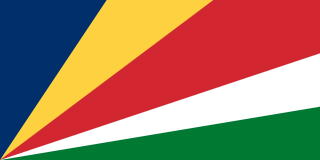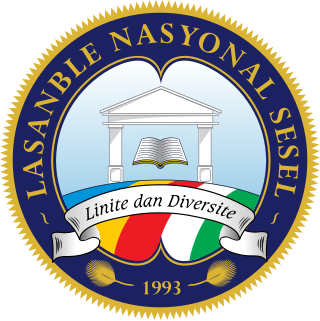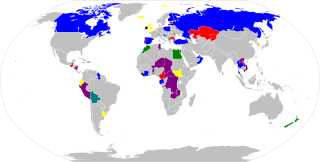
Seychelles, officially the Republic of Seychelles, is an archipelagic state consisting of 115 islands in the Indian Ocean. Its capital and largest city, Victoria, is 1,500 kilometres east of mainland Africa. Nearby island countries and territories include the Comoros, Madagascar, Mauritius, and the French overseas departments of Mayotte and Réunion to the south; and Maldives and the Chagos Archipelago to the east. It is the least populated sovereign African country, with an estimated 2020 population of 98,462.

The politics of Seychelles have historical roots in both one-party socialism and autocratic rule. Following independence from the United Kingdom in 1976, Seychelles was a sovereign republic until 1977, when the original President and leader of the Seychelles Democratic Party, James Mancham, was overthrown in a bloodless coup by the Prime Minister France-Albert René. René installed a single-party socialist state under the Seychelles People's Progressive Front which remained in place until 1993, when multiparty elections took place for the first time since independence. Modern day Seychelles governance takes place in a framework of a presidential republic, whereby the President of Seychelles is both head of state and head of government, and of a multi-party system. Executive power is exercised by the government. Legislative power is vested in both the government and the National Assembly.
Many entities have been called a Constitutional Commission with the general purpose of reviewing a constitution, or planning to create one.

France-Albert René was a Seychellois lawyer, politician and statesman who served as the second President of Seychelles from 1977 to 2004. He also served as the country's 2nd Prime Minister from its independence in 1976 to 1977.

Wavel Ramkalawan is a Seychellois politician and Anglican priest who has been serving as the president of Seychelles since 26 October 2020. Ramkalawan was an opposition MP from 1993 to 2011 and 2016 to 2020. He also served as the Leader of the Opposition from 1998 to 2011 and 2016 to 2020. On 25 October 2020, Ramkalawan won the presidential election, the country's first such victory for an opposition candidate since independence, marking its first successful peaceful transition of power.
This electoral calendar 2006 lists the national/federal direct elections held in 2006 in the de jure and de facto sovereign states and their dependent territories. Referendums are included, although they are not elections. By-elections are not included.
This electoral calendar 2007 lists the national/federal direct elections held in 2007 in the de jure and de facto sovereign states and their dependent territories. Referendums are included, although they are not elections. By-elections are not included.

The unicameral National Assembly is the Seychelles's legislative body.
Articles related to Seychelles include:

The history of Seychelles dates back to the fourth of the Portuguese India Armadas led by Vasco da Gama, though Seychelles was likely already known to Arab navigators and other sailors for many centuries. On 15 March 1503, the scrivener Thomé Lopes noted the sighting of an elevated island, doubtless one of the granitic islands and almost certainly Silhouette Island. The first recorded landing was by the men of the English East India Company ship Ascension, which arrived in Seychelles in January 1609.The islands were claimed by France in 1756. Seychelles remained uninhabited until the first settlers arrived on board the ship Thélemaque, which arrived on 27 August 1770. Captain Leblanc Lecore landed the first colonists, comprising 15 white men, eight Africans and five Indians. The Seychellois Creole language developed as a means of communication between the different races. The British frigate Orpheus commanded by Captain Henry Newcome arrived at Mahé on 16 May 1794. Terms of capitulation were drawn up and the next day Seychelles was surrendered to Britain. Following the fall of Mauritius to British forces, Captain Phillip Beaver of the Nisus arrived at Mahé on 23 April 1811 and took possession of Seychelles as a permanent colony of Britain. The Seychelles became an independent republic in 1976. Following a coup d'état, a socialist one-party state ruled the country from 1977 to 1993. The subsequent democratic Presidential elections were won by candidates of the same party.

Lesbian, gay, bisexual, and transgender (LGBT) persons in the Seychelles face legal challenges not experienced by non-LGBT residents. Same-sex sexual activity has been legal since 2016, and employment discrimination on the basis of sexual orientation is banned in the Seychelles, making it one of the few African countries to have such protections for LGBT people. However, LGBT people may nonetheless face stigmatization among the broader population.

A constitutional referendum was held in Seychelles on 15 November 1992. Although the proposed new constitution received the support of 54.6% of voters, it failed to pass the 60% threshold required for adoption. Subsequently, a second constitutional commission was created and a second draft put to a referendum the following year.

General elections were held in the Seychelles between 20 and 23 July 1993 following the approval of a new constitution in a referendum on 18 June. They were the first-ever multi-party elections for President and the first multi-party election for the National Assembly since 1974. The Assembly was increased from 22 to 33 seats by the addition of 11 seats to be elected by proportional representation in addition to the 22 constituency seats.

This national electoral calendar for 2011 lists the national/federal elections held in 2011 in all sovereign states and their dependent territories. By-elections are excluded, though national referendums are included.
This electoral calendar for the year 2001 lists the national/federal direct elections to be held in 2001 in the de jure and de facto sovereign states. By-elections are excluded, though national referendums are included.

This national electoral calendar for 2015 lists the national/federal elections held in 2015 in all sovereign states and their dependent territories. By-elections are excluded, though national referendums are included.

This national electoral calendar for 2016 lists the national/federal elections held in 2016 in all sovereign states and their dependent territories. By-elections are excluded, though national referendums are included.

This national electoral calendar for 2020 lists the national/federal elections held in 2020 in all sovereign states and their dependent territories. By-elections are excluded, though national referendums are included.

The Constitution of Seychelles is the governing document of the Republic of Seychelles.











